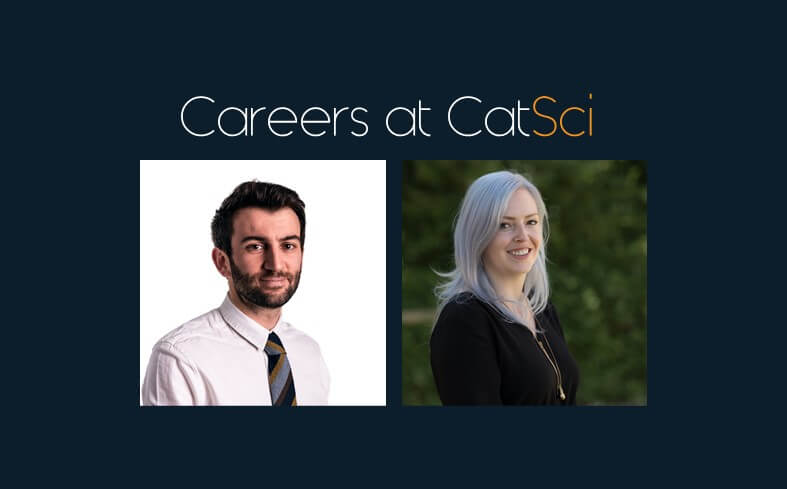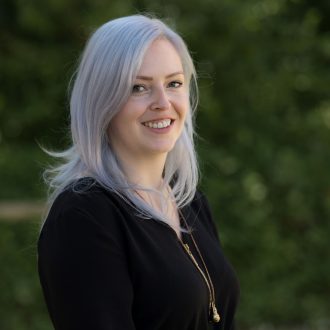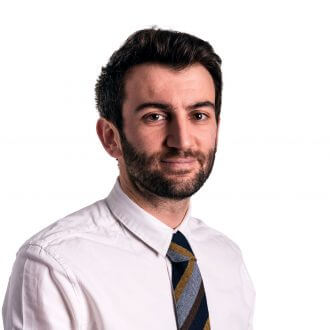- 12 May 2021
Careers at CatSci Part 3: Aled Williams & Beth Rees

A Conversation With Our Senior Analytical Scientists
Continuing with our Careers at CatSci series, we spoke to two more of our senior scientists: Aled Williams and Beth Rees. They explained the pathway to their roles at CatSci, what their daily work entails and what they enjoy most about being a part of the CatSci team. Read on to discover what it is like to be a Senior Analytical Scientist here at CatSci.

Beth Rees is a CatSci Senior Analytical Scientist, and began her career with a BSc in Forensic Science from the University of South Wales. Beth’s first laboratory role was at Penn Pharma, where she started out as an analyst and progressed to team leader. Beth then spent time as a Senior Analytical Chemist at Eurocaps and as a Civil Servant before joining the CatSci team two and a half years ago.

Aled Williams is another Senior Analytical Scientist at CatSci. Aled started his career by studying for his MSc in Chemistry with Medicinal Chemistry at Imperial College London, before completing his PhD in Chemistry at the University of Manchester. After spending a few years as an Analytical Scientist at both Bristol-Myers Squibb and AstraZeneca, Aled joined our team at CatSci in 2020.
Describe a typical day in your role
Beth Rees: I check my calendar to see what meetings I have, then check the instruments which have been running samples and calculate results for reporting. I’m working between four projects at the moment and I’m regularly in contact with the project leads for reporting or to help with anything that is needed. As we have the most experience with the analytical kit, the analytical team are quite often asked to troubleshoot when an instrument is misbehaving, so there’s a lot of time management skills required to ensure that we can get the kit back up and running asap around our project work.
Aled Williams: Early in the week I attend internal project meetings to present and discuss work and plan for the week ahead, as well as preparing slides for our external customer meetings. In the laboratory, my work is variable depending on the stage of the project. A less mature project may require the establishment of customer analytical methods or the development of new analytical methods to support route scouting experiments. More established projects may require analytical method verification to demonstrate method performance and robustness. Throughout the day I liaise with project chemists to ensure I am aware of any analytical problems they may be having, such as identifying impurities by mass spectrometry, re-developing chromatography methods to ensure separation of new impurities, resolving method robustness issues or fixing instrument faults.
What is the working environment at CatSci like?
Beth: An amazing mix of fun and busy! Everyone is focused on doing the best job they can, and being surrounded by people with such a breadth of technical knowledge and experience, there’s often cross-team technical discussions going on. Due to the current circumstances, we are trying to facilitate good mental health and well-being. The team is very close-knit already, but we also focus on having socially distant coffee mornings and weekly virtual lunch breaks. We’ve recently launched Wellbeing Thursdays that include activities ranging from short talks and desk yoga to drawing classes and quick fire quizzes.
Aled: Friendly, supportive, intellectually stimulating and challenging.
What element of your work do you enjoy most?
Beth: I enjoy the variety. As well as the analytical work, I’m involved in a number of improvement activities and I’m also very fortunate to be given the freedom to follow and develop my interest in the people side of CatSci, by being involved in the interview process for job candidates.
Aled: I enjoy working collaboratively to solve analytical challenges. For example, working with colleagues to elucidate impurity structures from mass spectrometry and NMR data. Piecing the puzzle together bit by bit and proposing structures that make sense both theoretically and experimentally is detective work that requires thinking outside the box and utilising your analytical and organic chemistry toolset to understand what is occurring at a molecular level.
When did you realise you wanted a career in this sector and what steps did you take to get there?
Beth: I used to read forensic science novels as a teenager and originally wanted to work as a scene of crime investigator so studied for a BSc Forensic Science at the University of South Wales. Work experience with the police made me realise that I didn’t have the stomach for the more gruesome aspects of the job, and the course was weighted very strongly towards analytical chemistry techniques which I really enjoyed so that directed my career path. I worked for 5 years as an analytical scientist and team leader at PCI Pharma before a career break, and then started at CatSci!
Aled: Following my undergraduate studies, I worked for a well-known analytical CRO that performed GMP analytical release and stability work for pharmaceutical companies. Here, I developed an interest in oligonucleotide chemistry and mass spectrometry as an analytical technique. This led to a PhD studying bioconjugation of oligonucleotides to peptides, and several years working for two top 10 pharmaceutical companies as an analytical chemist in development functions, working with both small and large molecule therapeutics.
What are your career aspirations?
Beth: I’d like to move to a people leadership role where I can combine my technical knowledge with an opportunity to support colleagues to excel in their careers.
Aled: I enjoy both the technical and customer facing sides of my role, particularly providing sound tailored solutions to solve our customers’ problems. I would like to continue to develop my expertise in mass spectrometry and become an industry expert in this area.
What advice would you give to your younger self?
Beth: The only way you will grow is if you challenge yourself. If someone asks you to do something in your professional life that scares you, say yes!
Aled: Don’t assume that because something has worked once, it will work again.
CatSci is celebrating its 10th birthday. What do you think is in store for CatSci in the next 10 years?
Beth: Growth in personnel and footprint, but also growth in capabilities. We will continually push what we can offer our customers.
Aled: Fast growth, new faces, new capabilities, more great science!
Are you interested in joining the CatSci team? You can find our current vacancies here
Take a look at the rest of our Careers at CatSci series here.